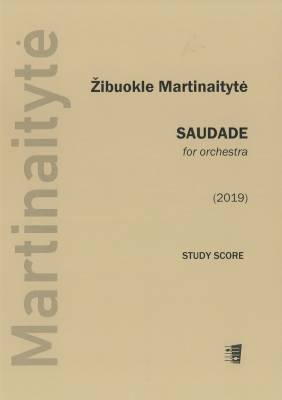Saudade : study score (2019) — for orchestra
Martinaityte, ZibuokleProduct information
| Title: | Saudade : study score (2019) — for orchestra | ||
| Authors: | Martinaityte, Zibuokle (Composer) | ||
| Product number: | 9790550117129 | ||
| Product form: | Sheet music | ||
| Availability: | Delivery in 7-16 days | ||
| Price per piece: | 21,47 € (18,92 € vat 0 %) | ||
|
|||
| Publisher: | Fennica Gehrman |
| Edition: | 2021 |
| Publication year: | 2021 |
| Language: | English |
| Pages: | 36 |
| Product family: | Frontpage Orchestral & stage works Orchestra |
| Finnish library classification: | 78.54 Orkesterit (yleensä enemmän kuin 25 soittajaa) |
| Key words: | Zibuokle Martinaityte, Lithuanian composers, Liettualaiset säveltäjät, Orkesterimusiikki, taskupartituuri |
The works of New York -based Lithuanian composer Žibuoklė Martinaitytė (b. 1973) have been lauded as breathtaking and profoundly moving. Her stimulating music bristles with energy and tension and revolves often around the subject of beauty, which she calls both a guiding principle and an aesthetic measure for
sonic quality.
According to the composer "Saudade in Portuguese means a deep emotional state of nostalgic or profound melancholic longing for an absent something or someone that one loves. One English translation of the word is missingness, although it might not convey the feeling of deep emotion attached to the word saudade. It can be described as emptiness, when someone (parents, friends) or something (places, experiences) that should be there in a particular moment is missing, and the individual feels this desire for presence as opposed to absence. It brings sad and happy feelings together: sadness for missing and happiness for experiencing the past.
According to the writer A.F.G. Bell, the famous saudade of the Portuguese is a vague and constant desire for something that does not and probably cannot exist, for something other than the present, a turning towards the past or towards the future; not an active discontent or poignant sadness but an indolent dreaming wistfulness.
Saudade has evolved into a philosophical concept that means "nostalgia for nostalgia", a meta-nostalgia, a longing oriented toward the longing itself. As poetess Florbela Espanca put it "I long for the longings I don't have.""
sonic quality.
According to the composer "Saudade in Portuguese means a deep emotional state of nostalgic or profound melancholic longing for an absent something or someone that one loves. One English translation of the word is missingness, although it might not convey the feeling of deep emotion attached to the word saudade. It can be described as emptiness, when someone (parents, friends) or something (places, experiences) that should be there in a particular moment is missing, and the individual feels this desire for presence as opposed to absence. It brings sad and happy feelings together: sadness for missing and happiness for experiencing the past.
According to the writer A.F.G. Bell, the famous saudade of the Portuguese is a vague and constant desire for something that does not and probably cannot exist, for something other than the present, a turning towards the past or towards the future; not an active discontent or poignant sadness but an indolent dreaming wistfulness.
Saudade has evolved into a philosophical concept that means "nostalgia for nostalgia", a meta-nostalgia, a longing oriented toward the longing itself. As poetess Florbela Espanca put it "I long for the longings I don't have.""




